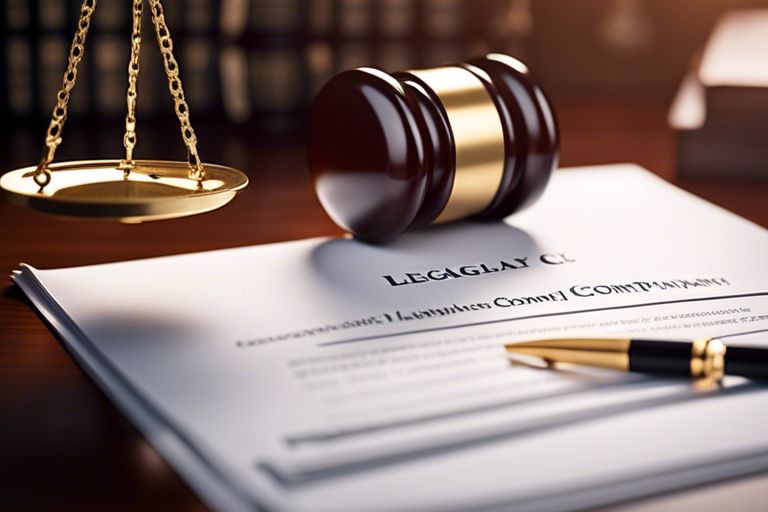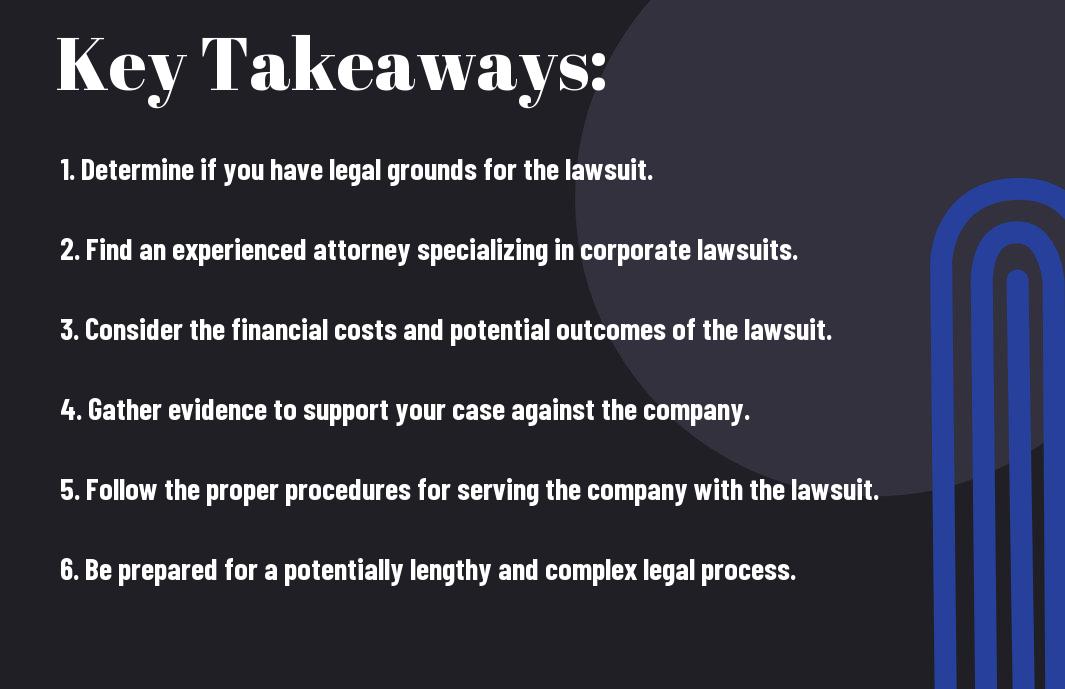As an individual, litigating against a company can be a daunting experience. However, there are times when it becomes necessary to take legal action in order to protect your rights and seek redress for any harm or damages caused. In this blog post, I will guide you through the legal steps and important considerations to keep in mind when considering suing a company. For more in-depth information on reasons to sue a company and understanding your legal rights, you can also refer to this What are reasons to sue a company? Understanding Your … article.
Key Takeaways:
- Consult with a lawyer: Before initiating a lawsuit against a company, it is crucial to seek legal counsel to understand the specifics of your case and the relevant laws and regulations.
- Gather evidence: Assemble all documents, emails, contracts, and any other relevant evidence to support your claim against the company.
- Understand the company’s assets: Research and assess the financial stability and assets of the company to determine if they can fulfill a potential judgment or settlement.
- File a complaint: Comply with all necessary legal procedures and file a complaint with the appropriate court. It is important to adhere to the statute of limitations for your claim.
- Consider settlement negotiations: Before pursuing a trial, explore the possibility of reaching a settlement with the company through negotiation or mediation.
Gathering Evidence
Assuming you have decided to sue a company for negligence, gathering evidence is a crucial step in building your case. Evidence will be essential in proving the company’s liability and the extent of your damages. It is important to gather as much evidence as possible to strengthen your case and increase your chances of success. For more detailed information on negligence and how to sue a company for it, you can visit How to Sue a Company for Negligence.
Identifying and documenting relevant information
First, it is important to identify and document all relevant information related to your case. This may include gathering any relevant documents, such as contracts, emails, or correspondence with the company. Additionally, you should collect any photographs, videos, or other tangible evidence that supports your claim. It is essential to keep detailed records of all interactions with the company, including dates, times, and individuals involved. This evidence will be vital in supporting your case and proving the company’s negligence.
Obtaining legal counsel for guidance on evidence collection
Seeking legal counsel to help guide you through the evidence collection process is crucial. A knowledgeable attorney can help you identify the most relevant evidence, advise you on how to collect and preserve it, and guide you on what not to do to avoid damaging your case. Your attorney can also help you navigate any legal complexities and ensure that the evidence you gather is admissible in court. Their expertise can be invaluable in building a strong case and maximizing your chances of success.
Filing a Lawsuit
Some situations may require you to file a lawsuit against a company in order to seek legal remedy for damages or injustices. Filing a lawsuit involves several important steps and considerations that you should be aware of before initiating legal action.
Choosing the appropriate court and jurisdiction
When filing a lawsuit against a company, it is essential to consider the appropriate court and jurisdiction for your case. I recommend consulting with a legal expert to determine the most suitable venue for your lawsuit. Factors such as the location of the company, the nature of the dispute, and the potential for a fair trial should be taken into account when making this decision. Choosing the wrong court or jurisdiction could have serious repercussions for your case, so it is important to carefully consider this aspect of the litigation process.
Following the necessary procedures and paperwork
Once you have determined the appropriate court and jurisdiction for your lawsuit, it is crucial to follow the necessary procedures and complete the required paperwork. This may include filing a formal complaint detailing the basis of your legal claims, serving the company with notice of the lawsuit, and adhering to specific deadlines and court rules. Failure to comply with the procedural requirements could result in your lawsuit being dismissed or delayed, so it is imperative to ensure that you are thorough and diligent in this aspect of the process.
Litigation Process
Not all cases proceed to trial, but it is essential to understand the litigation process in case your case does. Once a lawsuit has been filed, the litigation process begins. This process can be lengthy and complex, so it’s crucial to have a clear understanding of the steps involved.
Engaging in negotiations and settlement discussions
As a plaintiff, engaging in negotiations and settlement discussions is an important step in the litigation process. This is where both parties attempt to reach a resolution without going to trial. It’s an opportunity to potentially avoid the time, expense, and uncertainty of a trial. It’s important to note that settlements are legally binding and can waive your right to further legal action, so it’s crucial to weigh the pros and cons carefully.
Preparing for trial and courtroom proceedings
When preparing for trial and courtroom proceedings, it’s crucial to gather and organize all relevant evidence, documentation, and witness testimony to support your case. This includes depositions, witness testimonies, expert testimonies, and any other relevant material. Preparing for trial also involves understanding the court’s rules and procedures, as well as potentially engaging in pre-trial motions and hearings. It’s crucial to be well-prepared and familiar with the courtroom environment to present your case effectively.


Conclusion
Considering all points, it is clear that suing a company is a complex and challenging process that requires careful navigation of legal steps and considerations. From gathering evidence to filing a lawsuit and attending court proceedings, the process can be daunting. However, with careful preparation, legal consultation, and perseverance, you can take the necessary steps to protect your rights and seek justice. Remember to document everything, gather witnesses, and seek legal counsel to ensure that you have the best chance of success in your case. By understanding the legal steps and considerations involved in suing a company, you can confidently pursue the legal remedies available to you.
FAQ
Q: What are the legal steps to sue a company?
A: The legal steps to sue a company typically involve gathering evidence, filing a complaint, and serving the defendant. This is followed by the discovery process, pre-trial motions, and finally, the trial itself.
Q: What are the considerations to keep in mind when suing a company?
A: Considerations when suing a company include hiring an experienced attorney, understanding the company’s assets, and evaluating the strength of your case. It’s also important to consider the potential costs and duration of the legal process.
Q: How do I gather evidence to support my case against a company?
A: Gathering evidence to support your case against a company may involve collecting documents, records, and witness statements. It’s also important to preserve any communication or correspondence related to the matter.
Q: What are the potential outcomes of suing a company?
A: The potential outcomes of suing a company include a settlement agreement, a judgment in your favor, or a dismissal of the case. It’s important to understand the potential risks and rewards before pursuing legal action.
Q: What are the alternatives to suing a company?
A: Alternatives to suing a company may include negotiation, mediation, or arbitration. These alternative dispute resolution methods can often lead to a quicker and less costly resolution than traditional litigation.






Leave a comment